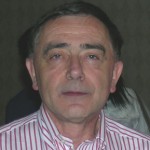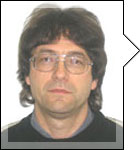Summer School On Cybernetics
within the 2012 IEEE Symposium on Intelligent Systems,
Sponsored by IEEE SMC Society
9am-6pm, 4 September, 2012, Hall 3
Federation of Science and Technology Unions of Bulgaria
108, Rakovski Street, Sofia, Bulgaria
Free entrance event. Registration is recommended in advance.
The Summer School is planned as a one day event before the IEEE IS’12 (the whole day of September 4). It is sponsored by the Technical Committee (TC) on Cybernetics of the Systems, Man and Cybernetics (SMC) Society of IEEE. It will be free for attendees (students, practitioners, researchers and young academics) and will include lectures and plenary talks by eminent and recognized researchers in this new field.
Tentative programme
| 9:00am-9:30am | Opening of the Summer School | Plamen Angelov, EIS TC Chair |
| 9:30am-10:30am | Talk 1 | Nikola Kasabov, Evolving neural networks and applications in Bioinformatics and Neuroinformatics |
| 10:30am-11:00am | Coffee break | |
| 11:00am-12:00am | Talk 2 | Plamen Angelov, Evolving Intelligence by Autonomous Learning Machines |
| 12:00-1:00pm | Lunch break | |
| 1:00pm-2:00pm | Talk 3 | Arthur Kordon, How to Apply Evolving Intelligent Systems in Industry? |
| 2:00pm-2:30pm | Coffee break | |
| 2:30pm-3:30pm | Talk 4 | Janusz Kacprzyk, Academician, D.Sc., Evolving systems and emergent properties: a complexity theory perspective |
| 3:30pm-4:30pm | Coffee break | |
| 4:30pm-5:30pm | Talk 5 | Alexander Gegov, Fuzzy Rule-based Networks: Theory and Applications |
| 5:30pm- 6:00pm |
Closing Session | Plamen Angelov |
The synopsis of the talks and a brief bio and photo of the authors follows:
Lecture 1
Nikola Kasabov, Auckland University of Technology, New Zealand
 Professor Nikola Kasabov is currently EU FP7 Marie Curie Visiting Professor at the Institute of Neuroinformatics, ETH and University of Zurich. He is the Director of the Knowledge Engineering and Discovery Research Institute (KEDRI), Auckland. He holds a Chair of Knowledge Engineering at the School of Computing and Mathematical Sciences at Auckland University of Technology. He is a Fellow of IEEE and Fellow of the Royal Society of New Zealand. Kasabov is the Immediate Past President of the International Neural Network Society (INNS) and a Past President of the Asia Pacific Neural Network Assembly (APNNA). He is a member of several technical committees of IEEE Computational Intelligence Society and a Distinguished Lecturer of the society .He has served as Associate Editor of Neural Networks, IEEE TrNN, IEEE TrFS, Information Science, J. Theoretical and Computational Nanosciences, Applied Soft Computing and other journals. Kasabov holds MSc and PhD from the Technical University of Sofia, Bulgaria. His main research interests are in the areas of neural networks, intelligent information systems, soft computing, bioinformatics, neuroinformatics. He has published more than 450 publications that include 15 books, 130 journal papers, 60 book chapters, 28 patents and numerous conference papers. He has extensive academic experience at various academic and research organisations in Europe and Asia. Prof. Kasabov has received the AUT VC Individual Research Excellence Award (2010), Bayer Science Innovation Award (2007), the APNNA Excellent Service Award (2005), RSNZ Science and Technology Medal (2001), and others. He is an Invited Guest Professor at the Shanghai Jiao Tong University (2010-2012). More information of Prof. Kasabov can be found on the KEDRI web site: http://www.kedri.info.
Professor Nikola Kasabov is currently EU FP7 Marie Curie Visiting Professor at the Institute of Neuroinformatics, ETH and University of Zurich. He is the Director of the Knowledge Engineering and Discovery Research Institute (KEDRI), Auckland. He holds a Chair of Knowledge Engineering at the School of Computing and Mathematical Sciences at Auckland University of Technology. He is a Fellow of IEEE and Fellow of the Royal Society of New Zealand. Kasabov is the Immediate Past President of the International Neural Network Society (INNS) and a Past President of the Asia Pacific Neural Network Assembly (APNNA). He is a member of several technical committees of IEEE Computational Intelligence Society and a Distinguished Lecturer of the society .He has served as Associate Editor of Neural Networks, IEEE TrNN, IEEE TrFS, Information Science, J. Theoretical and Computational Nanosciences, Applied Soft Computing and other journals. Kasabov holds MSc and PhD from the Technical University of Sofia, Bulgaria. His main research interests are in the areas of neural networks, intelligent information systems, soft computing, bioinformatics, neuroinformatics. He has published more than 450 publications that include 15 books, 130 journal papers, 60 book chapters, 28 patents and numerous conference papers. He has extensive academic experience at various academic and research organisations in Europe and Asia. Prof. Kasabov has received the AUT VC Individual Research Excellence Award (2010), Bayer Science Innovation Award (2007), the APNNA Excellent Service Award (2005), RSNZ Science and Technology Medal (2001), and others. He is an Invited Guest Professor at the Shanghai Jiao Tong University (2010-2012). More information of Prof. Kasabov can be found on the KEDRI web site: http://www.kedri.info.
Evolving neural networks and applications in Bioinformatics and Neuroinformatics
The talk presents the evolution of the NN techniques, from perceptrons to evolving spiking neural networks along with their applications in bioinfortics (e.g. gene data analysis) and neuroinformatics (e.g. EEG data analysis). The talk is targeting an audience of students, researchers and practitioners who do not have prior knowledge on NN.
Lecture 2
Plamen Angelov, Lancaster University, UK
 Dr Plamen Angelov, is a Reader in Computational Intelligence and coordinator of the Intelligent Systems Research at Infolab21, Lancaster University, UK. He is a Senior Member of the IEEE and INNS, Chair of the Technical Committe on Evolving Intelligent Systems, Systems, Man and Cybernetics Society. He is also a member of the UK Autonomous Systems National TC, of the Autonomous Systems Study Group, NorthWest Science Council, UK and of the Autonomous Systems Network of the Society of British Aerospace Companies. He is a very active academic and researcher who authored or co-authored over 160 peer reviewed publications in leading journals (60+) peer-reviewed conference proceedings, three patents, two research monograph, half a dozen edited books, and has an active research portfolio in the area of computational intelligence and autonomous system modelling, identification, and machine learning. He has internationally recognised pioneering results into on-line and evolving methodologies and algorithms for knowledge extraction in the form of human-intelligible fuzzy rule-based systems and autonomous machine learning. Dr. Angelov is also the founding Editor-in-Chief of the Springer’s journal on Evolving Systems and serves as an Associate Editor of several other international journals, including IEEE Transactions on Fuzzy systems, IEEE Transactions on Systems, Man and Cybernetics, Elsevier’s Fuzzy Sets and Systems, International Journal on Automation, Mobile Robotics and Intelligent Systems, and others. He is the General Chair of the premier conference in Neural networks area, IJCNN-2013, Dallas, Texas, Programme Committee co-Chair of the premier conference in fuzzy systems area, FUZZ-IEEE-2014 within the WCCI-2014 and Prorgamme Committee Chair of the premier event in Cybernetics, 2013 IEEE Conference on Cybernetics, CYCON-2013, Lausanne, Switzerland. Dr. Angelov also Chairs annual conferences organised by IEEE (2006 UK, 2008 Germany, 2009 USA, 2010 UK, 2011 France, 2012 Spain), acts as Visiting Professor (2005, Brazil; 2007, Germany; 2010, Spain). Dr. Angelov is also a very active researcher leading projects funded by EPSRC, ASHRAE-USA, EC FP6 and 7, The Royal Society, Nuffield Foundation, DTI/DBIS, MoD, industry (BAE Systems, 4S Information Systems, Sagem/SAFRAN, United Aircraft Corporation and Concern Avionica, NLR, etc.), such as the ₤32M ASTRAEA project. The work on this project was recognised by him being co-recipient of ‘The Engineer Innovation and Technology 2008 Award in two categories: i) Aerospace and Defence and ii) The Special Award. Other examples include multimillion projects SVETLANA (with SAGEM/SAFRAN, NLR, OAC-Russia), CAST (with Cambridge and NASA), GAMMA (with BAE Systems), etc. More information can be found at www.lancs.ac.uk/staff/angelov
Dr Plamen Angelov, is a Reader in Computational Intelligence and coordinator of the Intelligent Systems Research at Infolab21, Lancaster University, UK. He is a Senior Member of the IEEE and INNS, Chair of the Technical Committe on Evolving Intelligent Systems, Systems, Man and Cybernetics Society. He is also a member of the UK Autonomous Systems National TC, of the Autonomous Systems Study Group, NorthWest Science Council, UK and of the Autonomous Systems Network of the Society of British Aerospace Companies. He is a very active academic and researcher who authored or co-authored over 160 peer reviewed publications in leading journals (60+) peer-reviewed conference proceedings, three patents, two research monograph, half a dozen edited books, and has an active research portfolio in the area of computational intelligence and autonomous system modelling, identification, and machine learning. He has internationally recognised pioneering results into on-line and evolving methodologies and algorithms for knowledge extraction in the form of human-intelligible fuzzy rule-based systems and autonomous machine learning. Dr. Angelov is also the founding Editor-in-Chief of the Springer’s journal on Evolving Systems and serves as an Associate Editor of several other international journals, including IEEE Transactions on Fuzzy systems, IEEE Transactions on Systems, Man and Cybernetics, Elsevier’s Fuzzy Sets and Systems, International Journal on Automation, Mobile Robotics and Intelligent Systems, and others. He is the General Chair of the premier conference in Neural networks area, IJCNN-2013, Dallas, Texas, Programme Committee co-Chair of the premier conference in fuzzy systems area, FUZZ-IEEE-2014 within the WCCI-2014 and Prorgamme Committee Chair of the premier event in Cybernetics, 2013 IEEE Conference on Cybernetics, CYCON-2013, Lausanne, Switzerland. Dr. Angelov also Chairs annual conferences organised by IEEE (2006 UK, 2008 Germany, 2009 USA, 2010 UK, 2011 France, 2012 Spain), acts as Visiting Professor (2005, Brazil; 2007, Germany; 2010, Spain). Dr. Angelov is also a very active researcher leading projects funded by EPSRC, ASHRAE-USA, EC FP6 and 7, The Royal Society, Nuffield Foundation, DTI/DBIS, MoD, industry (BAE Systems, 4S Information Systems, Sagem/SAFRAN, United Aircraft Corporation and Concern Avionica, NLR, etc.), such as the ₤32M ASTRAEA project. The work on this project was recognised by him being co-recipient of ‘The Engineer Innovation and Technology 2008 Award in two categories: i) Aerospace and Defence and ii) The Special Award. Other examples include multimillion projects SVETLANA (with SAGEM/SAFRAN, NLR, OAC-Russia), CAST (with Cambridge and NASA), GAMMA (with BAE Systems), etc. More information can be found at www.lancs.ac.uk/staff/angelov
Evolving Intelligence by Autonomous Learning Machines
The problem of extracting knowledge and generating interpretable human interpretable knowledge from data has been around for some time. Nowadays the data are streaming from Internet, social and sensor networks, portable devices with mobile communication and low cost high volume data stores. The challenge is to adapt the existing and/or develop innovative methodologies to address the problem of autonomous generation of evolving mathematical structures by learning creating in this way the new generation of potentially small and portable smart gadgets with attractive properties – ALMAs (autonomous learning machines) that can also communicate/transmit the knowledge that was extracted from the data streams, collaborate, adapt to the environment and become an important part of the future networked society.
In this lecture, of course, we cannot solve or address all problems that ALMA relates to, but will try to lay out the principles and basic steps to create ALMA and will compare this with the traditional approach. We will cover the topics of recursive density estimation (RDE), evolving data clouds, evolving classifiers, predictors and controllers. It will be demonstrated how RDE can be used for outlier detection and also for forming new data clouds which in turn can serve as granules of the data space responsible for local simpler models in a multi-model approach. Te recently introduced approach for evolving clouds will be compared to the evolving and traditional clustering approaches and its applicability to model structure synthesis problems will be demonstrated. Examples of application problems of classification and prediction will be illustrated. The proposed ALMA can be used as a basis of software algorithms and agents and hardware devices in various problems in industry, defense, security, space exploration, robotics, human behavior analysis, assisted living, etc.
Lecture 3
Arthur Kordon, The Dow Chemical, USA
 Dr. Arthur Kordon is an Advanced Analytics Leader in the Advanced Analytics Group, The Dow Chemical Company in Freeport, Texas, USA. He is an internationally recognized expert in applying computational intelligence and advanced analytics in industry. Dr. Kordon has successfully introduced several novel technologies for improved manufacturing and new product design, such as robust inferential sensors, automated operating discipline, accelerated fundamental model building, etc. His research interests include application issues of computational intelligence, robust empirical modeling, and integrating data mining in forecasting. He has published more than 70 papers, two books and ten book chapters in the area of applied computational intelligence and advanced analytics. Dr. Kordon is a member of the Technical Committee on Evolutionary Computation of IEEE Computational Intelligence Society.
Dr. Arthur Kordon is an Advanced Analytics Leader in the Advanced Analytics Group, The Dow Chemical Company in Freeport, Texas, USA. He is an internationally recognized expert in applying computational intelligence and advanced analytics in industry. Dr. Kordon has successfully introduced several novel technologies for improved manufacturing and new product design, such as robust inferential sensors, automated operating discipline, accelerated fundamental model building, etc. His research interests include application issues of computational intelligence, robust empirical modeling, and integrating data mining in forecasting. He has published more than 70 papers, two books and ten book chapters in the area of applied computational intelligence and advanced analytics. Dr. Kordon is a member of the Technical Committee on Evolutionary Computation of IEEE Computational Intelligence Society.
Dr. Kordon holds a Master of Science degree in Electrical Engineering from the Technical University of Varna, Bulgaria in 1974 and a Ph.D. degree in Electrical Engineering from the Technical University of Sofia, Bulgaria in 1990.
How to apply intelligent systems in industry?
The tutorial gives a systematic view, based on the experience from The Dow Chemical Company, of the key issues for applying and creating value with intelligent systems. The competitive advantages and the benefits of using intelligent systems in industry are defined as well as the criteria for successful practical applications. Special attention is given to marketing the approach to technical and non technical audience. The implementation issues of several intelligent systems techniques, such as neural networks, support vector machines, Pareto-front genetic programming, and particle swarm optimizers are discussed.
An integrated methodology, which uses the discussed methods for variable selection, data compression, and robust empirical model building is proposed and illustrated with successful industrial applications in the area of process monitoring, optimization, data mining, and new product design. The open technical and non-technical issues of applied intelligent systems are addressed and selected areas of future research are recommended.
The academic attendees will benefit from the tutorial by better awareness of the economic impact of intelligent systems, understanding the industrial needs, and learning about the details of successful industrial applications. The industrial attendees will benefit from the tutorial by understanding the different sources of value creation of intelligent systems, the proposed application strategy for introducing and leveraging the technology in an industrial setting, and the shared experience from real-world applications.
Lecture 4
Janusz Kacprzyk DSc, Polish Academy of Sciences, Poland
 Janusz Kacprzyk is Professor of Computer Science at the Systems Research Institute, Polish Academy of Sciences, Professor at WIT – The Warsaw School of Information Technology, and Professor of Automatic Control at PIAP – Industrial Institute of Automation and Measurements, all in Warsaw, Poland, and the Department of Electrical and Compter Engineering, Cracow University of Technology, Cracow, Poland. He is Chair of the Provosts’ Council of the Department of Engineering Sciences, Polish Academy of Sciences, being responsible for the supervision and evaluation of 13 research institutes and 21 national committees in engineering sciences at the Polish caemy of Sciences. He is Honorary Professor at the Department of Mathematics, Yli Normal University, Shanxi, China, and Visiting Scientist at RIKEN Brain Research Institute in Wako-shi, Japan, and in Tijuana Institute of Technology in Mexico. He has been a visiting professor at many universities in the USA, England, Italy, UK and Mexico. He is Academician (Full Member) of the Polish Academy of Sciences and Foreign Member of the Spanish Royal Academy of Economic and Financial Sciences (RACEF).
Janusz Kacprzyk is Professor of Computer Science at the Systems Research Institute, Polish Academy of Sciences, Professor at WIT – The Warsaw School of Information Technology, and Professor of Automatic Control at PIAP – Industrial Institute of Automation and Measurements, all in Warsaw, Poland, and the Department of Electrical and Compter Engineering, Cracow University of Technology, Cracow, Poland. He is Chair of the Provosts’ Council of the Department of Engineering Sciences, Polish Academy of Sciences, being responsible for the supervision and evaluation of 13 research institutes and 21 national committees in engineering sciences at the Polish caemy of Sciences. He is Honorary Professor at the Department of Mathematics, Yli Normal University, Shanxi, China, and Visiting Scientist at RIKEN Brain Research Institute in Wako-shi, Japan, and in Tijuana Institute of Technology in Mexico. He has been a visiting professor at many universities in the USA, England, Italy, UK and Mexico. He is Academician (Full Member) of the Polish Academy of Sciences and Foreign Member of the Spanish Royal Academy of Economic and Financial Sciences (RACEF).
His research interests include intelligent systems, soft computing, fuzzy logic, decision making, decision analysis and decision support, database querying, information retrieval, data analysis, data mining, etc.
He is President of the Polish Society Operational and Systems Research Society and Past President of IFSA (International Fuzzy Systems Association).
He is Fellow of IEEE and IFSA. He received The 2005 IEEE CIS Fuzzy Pioneer Award for pioneering works on multistage fuzzy control, notably fuzzy dynamic programming, in 2006 The Sixth Kaufmann Prize and Gold Medal for pioneering works on the use of fuzzy logic in economy and management, in 2007 the Pioneer Award for Outstanding Contributions to Granular Computing and Computing with Words by the Silicon Valley IEEE CIS Chapter, and in 2010 The Award of the Polish Neural Network Society for contributions to the Polish computational intelligence society.
His publication record is: 5 books, 50 volumes, ca. 400 papers. He is Editor in chief of 4 Springer’s book series, and a co-editor of one Springer book series, is on the editorial boards of ca. 40 journals, and was a member of the IPC at more than 300 conferences.
Evolving systems and emergent properties: a complexity theory perspective
We consider the so called complex evolving systems which are basically meant as such systems which can learn and adjust their structure and behavior over time. We discuss first how the complexity is meant and show that it is due to intricate inter-relationships of a system’s constituent elements, and ways of how the system evolves. As the first isue, we discuss the problem of nonlinearity in the sense that though the behavior of a system’s constituents can be predictable, due to multiple interactions and a complex structure of dependencies, a system’s behavior may become inpredictable, plagued by multiple autcomes, a high sensitivity to intitial conditions, etc. We discuss the concepts of an emergent property and behavior which will be basically meant in Goldstein’s sense as the arising of novel and coherent structures, patterns and properties during the process of self-organization in complex systems.
We will briefly show hown the general concepts considered are related to new directions in systems modeling, for instance fuzzy evolving systems.
Lecture 5
Alexander Gegov, University of Portsmouth, UK
 Alexander Gegov is Reader in Computational Intelligence at the School of Computing, University of Portsmouth, UK. He holds a PhD in Control Systems and a DSc in Intelligent Systems – both from the Bulgarian Academy of Sciences. He has been Humboldt Guest Researcher at the University of Duisburg in Germany and EU Visiting Researcher at the Delft University of Technology in the Netherlands. Alexander Gegov’s research interests are in the theory of computational intelligence and complex systems as well as their applications for modelling, simulation and control. He has authored more than 20 journal articles and 40 conference papers. He is also sole author of 3 research monographs published by Springer. He has recently introduced and started the development of the novel theory of fuzzy networks. Alexander Gegov is Book Review Editor for ‘Fuzzy Sets and Systems’. He is also Referee for ‘IEEE Transactions on Fuzzy Systems’ and ‘IEEE Transactions on Neural Networks’. He has presented invited lectures and tutorials at IEEE Conferences on Fuzzy Systems, Intelligent Systems and Computational Intelligence. He is Member of organisations such as EUSFLAT, IFAC and EUROSCIENCE.
Alexander Gegov is Reader in Computational Intelligence at the School of Computing, University of Portsmouth, UK. He holds a PhD in Control Systems and a DSc in Intelligent Systems – both from the Bulgarian Academy of Sciences. He has been Humboldt Guest Researcher at the University of Duisburg in Germany and EU Visiting Researcher at the Delft University of Technology in the Netherlands. Alexander Gegov’s research interests are in the theory of computational intelligence and complex systems as well as their applications for modelling, simulation and control. He has authored more than 20 journal articles and 40 conference papers. He is also sole author of 3 research monographs published by Springer. He has recently introduced and started the development of the novel theory of fuzzy networks. Alexander Gegov is Book Review Editor for ‘Fuzzy Sets and Systems’. He is also Referee for ‘IEEE Transactions on Fuzzy Systems’ and ‘IEEE Transactions on Neural Networks’. He has presented invited lectures and tutorials at IEEE Conferences on Fuzzy Systems, Intelligent Systems and Computational Intelligence. He is Member of organisations such as EUSFLAT, IFAC and EUROSCIENCE.
Fuzzy Rule Based Networks: Theory and Applications
The tutorial presents the novel theory of fuzzy networks as structurally evolved fuzzy systems and the application of this theory for some case studies. The first tutorial section discusses complexity as a systemic feature and the ability of fuzzy systems to handle intelligently different attributes of complexity. Section 2 reviews several types of fuzzy systems in the context of systemic complexity, including systems with single, multiple and networked rule bases. Section 3 introduces formal models for fuzzy networks such as Boolean matrices, binary relations, block schemes and topological expressions. Section 4 presents basic operations on rule base nodes in fuzzy networks, including merging and splitting in horizontal, vertical and output context. Section 5 discusses structural properties of basic operations such as associativity of merging and variability of splitting in horizontal, vertical and output context. Section 6 describes advanced operations on rule base nodes in fuzzy networks, including node transformation for input augmentation, output permutation and feedback equivalence, as well as node identification in horizontal, vertical and output merging. Section 7 shows the application of the theoretical results from Sections 3-6 in feedforward fuzzy networks with single or multiple levels and layers. Section 8 illustrates the application of the theoretical results from Sections 3-6 in feedback fuzzy networks with single or multiple local and global feedback. Section 9 evaluates fuzzy networks by means of assessment of structural complexity, composition of hierarchical fuzzy systems, decomposition of standard fuzzy systems, indicators of model performance and applications for case studies. Section 10 highlights the theoretical significance, the application areas and the methodological impact of fuzzy networks.
The theoretical sections of the tutorial will benefit mainly academic researchers in the area of intelligent systems. These sections will make the researchers familiar with novel techniques for modeling complex processes characterised by non-linearity, uncertainty, dimensionality and structure by means of fuzzy networks as fuzzy systems with networked rule bases. The case studies in the tutorial will benefit predominantly industrial participants from engineering and business that are interested in applying intelligent systems such as fuzzy networks for modeling complex processes.




